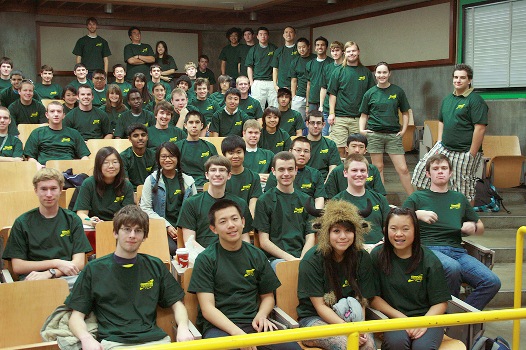About Us
Want to Join our team?
Cal Poly’s Computer Engineering Department invites applications for full-time, tenure-track Computer Engineering faculty positions at the Assistant Professor rank beginning Fall Quarter 2024. If you’re passionate about computer engineering, apply now and become part of our amazing academic community.
our mission
The mission of the Computer Engineering Department (CPE) is to provide students with a well-rounded education encompassing the theory and practice of selected, balanced topics in electrical engineering and computer science, to enable students to contribute and continue their education in a wide range of computer-related engineering careers. The program seeks to emphasize “hands-on” experience, problem solving skills, the creative process and responsible action. Through professional development activities, faculty contribute to the advancement of the state-of-the-art, and strive to directly incorporate this experience in the classroom.
See Cal Poly Catalog for more information
Our Vision
Computer Engineering holds dear and commits to the following vision of culture,
community, collaboration, and support:
The Computer Engineering Department is a place that supports diversity in race, gender, sexuality, ability, class, and other social identities (in all their combinations) in a manner that transcends current institutional structures.
The Computer Engineering Department is a place in which all find community, and where there are support structures that connect students with their peers, that provide mentoring between faculty and students, and that promote collaborative work between faculty. The Computer Engineering Department is a place where each of us can say, “I belong here.”
The Computer Engineering Department’s faculty follows a distributed leadership model where all members are leaders in their own way. Faculty trusts in and actively backs each other as leaders. The department values the interdisciplinarity of faculty within and beyond CPE.
The Computer Engineering Department is a place where if one encounters an unjust barrier, it is the system that yields. We acknowledge the immense cultural wealth that people bring with them to the Computer Engineering Department and we strive to act in a manner to ensure that wealth is valued and celebrated.
The Computer Engineering Department is a place where all understand and value Computer Engineering being more than a sum of the traditional fields from which it grew. The Computer Engineering Department is a place that has insight into societal needs and is agile to adapt to address those needs from a critical theory orientation.
The Computer Engineering Department is a place from which industry continues to seek new hires; they value our students’ technical expertise, and, of equal importance, seek out our students because of their diversity in body and voice, because of their ability to negotiate complexity and ambiguity, and because of their capacity, agency, and inclination for change. Our graduates pursue graduate studies and work in nonprofits and educational organizations in increasingly greater numbers.

Our Curriculum
Computer engineers learn to integrate a variety of skills, knowledge, and expertise at the intersection of hardware and software. The Computer Engineering Department attracts people from diverse backgrounds, promotes a sense of support and inclusion, encourages whole person engagement and development, and nurtures reflective engineering practice. Our graduates are valued for their diversity in body and voice, their ability to negotiate complexity and ambiguity, and their capacity and agency to make a positive impact on society.
Educational Objectives
Four educational objectives inspire alumni of the Cal Poly Computer Engineering program to excel professionally:
1
Make positive contributions to society and the practice of computer engineering by applying foundational knowledge and the engineering process to solve engineering problems.
2
Work in an individual or team environment in a socially responsible manner.
3
Engage in lifelong learning through continued professional development or graduate studies.
4
Communicate effectively and demonstrate leadership.
The program prepares graduates for professional practice in industry, as well as continued study in graduate school. Cal Poly’s “learn by doing” philosophy is emphasized by integrating design throughout the curriculum, especially in the numerous design-centered laboratories. In the required senior capstone experience, which is a group-project based course completed over two quarters, students demonstrate their understanding of engineering knowledge and their ability to apply that knowledge creatively to practical problems.
Current Areas of Special Interest include:
- Autonomous Systems
- Edge Computing and the Internet of Things
- Self -Adapting and Self-Healing Systems
- Ethical Computing, Security & Privacy
- System on a Chip
- Embedded Systems
- Computer Architecture
- Parallel & Distributed Systems
- Computer Networks
This integrated approach allows students to work effectively in such diverse areas as digital systems simulation and digital control systems. Knowledge and laboratory experience in computer architecture and structures provide the understanding necessary to design and build computer systems, computer networks and digital communications systems. A thorough knowledge of modern microprocessors and microcontrollers enables the graduate to apply these technologies in applications such as robotics, medical and data acquisition. Twelve units of technical electives allow students the option to specialize in an area of special interest.
See Cal Poly Catalog for more information
Learning Outcomes
In addition to the general abilities expected of College of Engineering graduates, computer engineering students are expected to graduate with:
An ability to identify, formulate, and solve complex engineering problems by applying principles of engineering, science, and mathematics.
An ability to apply engineering design to produce solutions that meet specified needs with consideration of public health, safety, and welfare, as well as global, cultural, social, environmental, and economic factors.
An ability to communicate effectively with a range of audiences.
An ability to recognize ethical and professional responsibilities in engineering situations and make informed judgments, which must consider the impact of engineering solutions in global, economic, environmental, and societal contexts.
An ability to function effectively on a team whose members together provide leadership, create a collaborative and inclusive environment, establish goals, plan tasks, and meet objectives.
An ability to develop and conduct appropriate experimentation, analyze and interpret data, and use engineering judgment to draw conclusions.
An ability to acquire and apply new knowledge as needed, using appropriate learning strategies.
See Program Learning Outcomes for more information

Graduation & Enrollment
In addition to admission, enrollment, and graduate date data you can find here for the whole university, click on the link below to find the number of students enrolled (full time (FT) and part time (PT)) as well as the number of students who graduated each year for the past 6 years for our program.
accreditation
The BS degree program in Computer Engineering is accredited by the Engineering Accreditation Commission of ABET, https://www.abet.org, under the General Criteria and the Electrical, Computer, Communications, Telecommunications, and Similarly Named Engineering Programs Program Criteria.
To learn more about the career directions that we set for our alumni, see the CPE Catalog. For more information on the abilities of our graduates, see our Program Educational Objectives and Program Learning Outcomes. See the College of Engineering website for more information on accreditation.
